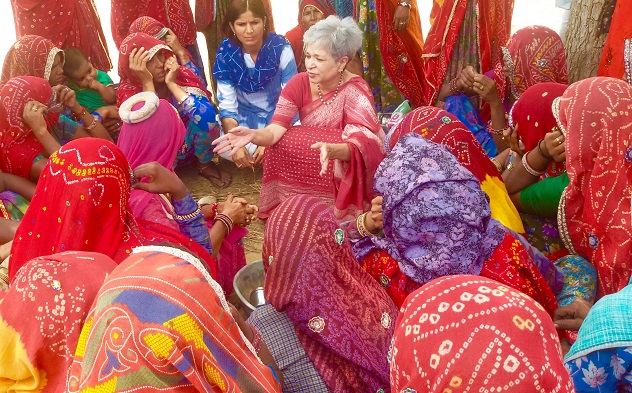
- Chairperson, Dastkar (Textiles, NGO)
“I don't understand why we don't see that craft is a huge economic sector, which is also unique in the world. We should be investing in it just like any other economic activity.”
Summary
In this interview, Laila Tyabji discusses the unusual arc of her career as an artist and freelance designer, and explains the factors and motivations that led her to become involved in the founding of Dastkar, a non-profit organization dedicated to working with craftspeople across India to promote the revival of traditional crafts and develop an urban market for them.
After spending several years working as a freelance designer in Delhi, Tyabji recounts how she was approached by the Gujurat State Handicrafts Emporium about an opportunity to travel to Kutch as a visiting designer. She was tasked with assisting local craftspeople in the improvement of their workmanship and in the development of skills such as costing, pricing, and quality control—all of which would help them improve their production to enable a sustainable future through craft. This experience proved to be a turning point in Tyabji’s life. She spent six months among the craftspeople of Kutch in order to truly understand their situation and how she could help to improve their production. Of this experience, Tyabji reflected: “You have to listen with your head and your heart, as well as your ears if you want to work in a participatory way with craftspeople.”
After six months Tyabji returned to Delhi and soon found herself presented with another unusual opportunity: to run the shopping arcade at the new Taj hotel. In the interview, she explains how, from the beginning, she was determined to use the opportunity to showcase traditional Indian crafts to urban Indian buyers: “I wanted the store to be for Indians to buy things—not just foreign travelers who want touristy knick-knacks—and that prices should also be positioned for an Indian buyer.” The idea was a great success, however after some time, an emphasis on profits disrupted the business—as neither the store manager nor suppliers found it cost-effective to pack and transport products (sometimes rather large items) from rural areas to Delhi. Seeing the great potential—and more importantly the market—for rural handicrafts in Indian cities, Tyabji became frustrated: “It’s so curious that there are craftspeople who live off making these products, and there are customers in Delhi who want to buy them… But just because organizations in the middle are so bent on their bottom line,” that connection cannot be established. Tyabji set out to do just that.
Indeed, in some ways, it was the synthesis of these two experiences—gaining a deep appreciation for craft and recognizing the market potential—that led Laila to what became Dastkar. In the interview, she emphasizes that she was one of several founders, who each brought a unique skillset to the organization. The diversity of skills among the founders reflected the diverse needs and requirements of the craftspeople with whom they would be working, and the model quickly became a success. In the interview Tyabji discusses some of Dastkar’s first projects, including working with SEWA Lucknow, the Sandur Lambani craftspeople and others. She also discusses some of the challenges confronted by the organization in the early years, including the struggle of overcoming the initial skepticism of craftspeople at the possibility of remuneration, and at establishing self-sustaining production systems after the departure of Dastkar.
Throughout her career, Tyabji has also been an active public figure—advocating for the preservation and promotion of traditional crafts, as well as working to promote religious tolerance as a Muslim woman in India. She concludes the interview by sharing her thoughts on the future of Indian crafts and her hopes for building a more accepting, tolerant society.
Additional Resources
- Laila Tyabji, "Growing Up in a Muslim Family That Didn’t Fit Any Stereotypes," The Wire, July 25, 2018.
- Laila Tyabji, "This is really rubbish: Laila Tyabji tears into NYT article equating sari with Hinduism," Daily O, November 16, 2017.
- Aashmita Nayar, "Laila Tyabji Wears Cotton Saris For A Month, Shows How Fabulous They Are," HuffPost, August 7, 2016.
- Shefalee Vasudev, "Laila Tyabji: The Crafts Revivalist," Live Mint, August 9, 2014.
- Claire Wilkinson-Weber, Embroidering Lives: Women’s Work and Skill in the Lucknow Embroidery Industry. State University of New York Press: 1999, Chapter 6.
Interview Citation Format
Interview with Laila Tyabji, interviewed by Prithwiraj Choudhury, August 23, 2018, Delhi, India, Creating Emerging Markets Project, Baker Library Historical Collections, Harvard Business School, https://www.hbs.edu/creating-emerging-markets/Pages/default.aspx.
